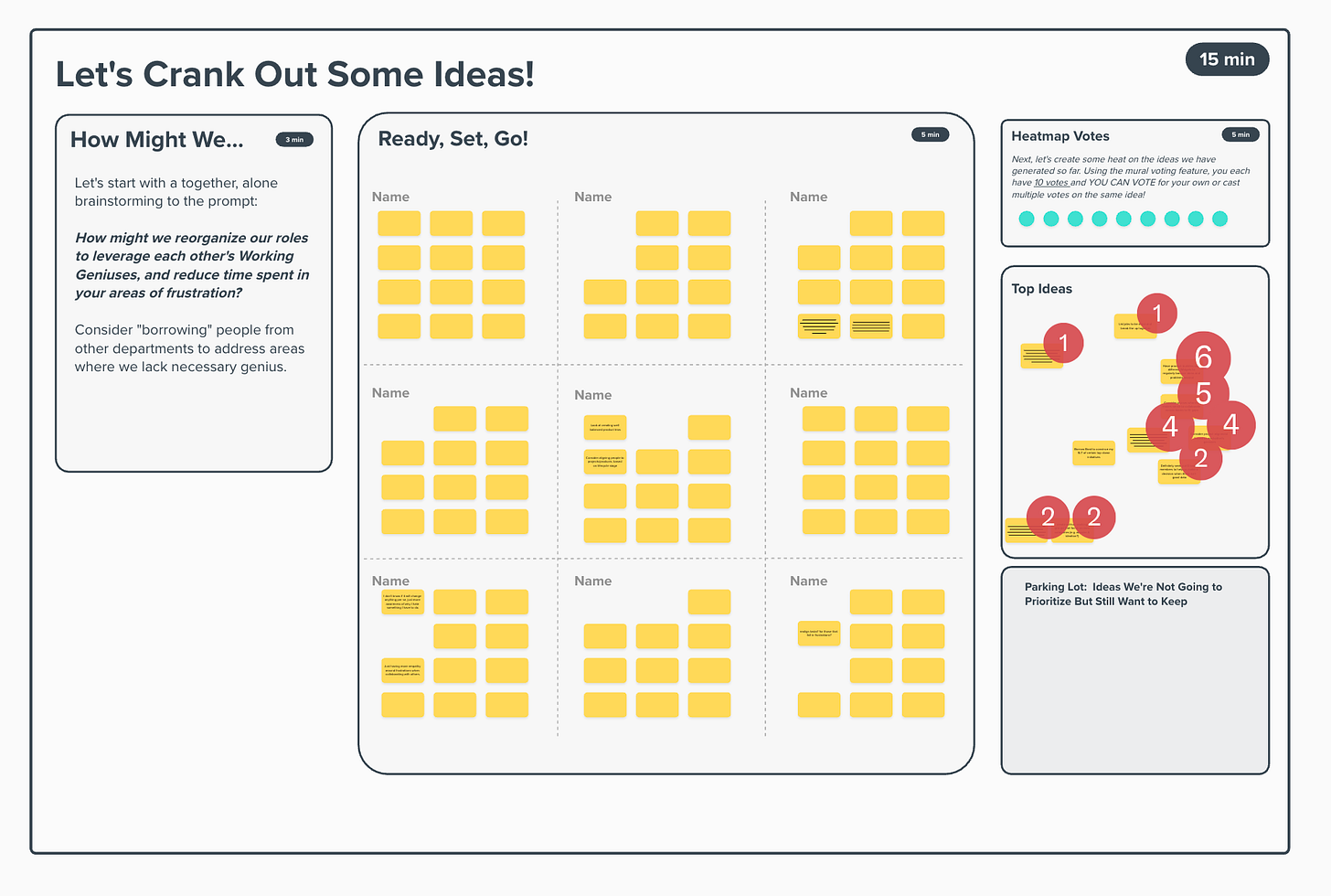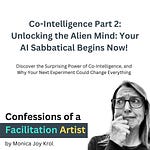Welcome back to Confessions of a Facilitation Artist! If you caught my last post, you know we kicked off a new series diving into Patrick Lencioni’s Six Types of Working Genius, a framework that helps teams and individuals discover the work that brings them joy and the work that drains them.
Today, I’m excited to share a behind-the-scenes look at a recent team retreat I designed and facilitated using this powerful model, along with some fresh lessons and practical tips you can use with your own teams.
Designing a Virtual Working Genius Retreat
The inspiration for this retreat came from the immense organizational change my team had been experiencing. With new roles, shifting responsibilities, and a mix of seasoned and newer team members, I wanted to create a space for everyone to reflect on what truly energizes them at work…AND, just as importantly, what leads to frustration. The Working Genius framework, with its six types (Wonder, Invention, Discernment, Galvanizing, Enablement, and Tenacity), was the perfect tool to guide this exploration.
Given our distributed setup, I built the workshop in Mural and ran it virtually over two hours. The goal was simple: help each person identify their unique working geniuses and frustrations, spark meaningful conversations, and ideate ways we could work better together.
Icebreakers That Matter
We kicked things off with a classic icebreaker: everyone shared their name, their first job, and what they learned from it. I know, it’s a familiar one, but in this context, it was magic! Hearing stories about first jobs not only humanized each team member, it also revealed early clues about their working geniuses.
For example, I shared how my first job at a dry cleaner had me obsessed with creating efficient systems for pressing shirts, a hint at my own Invention genius. The connections between those early experiences and our current working styles were eye-opening for everyone.
Mapping Our Geniuses (and Frustrations)
The heart of the retreat was reviewing our Working Genius assessment results as a team. Each person reflected on their top geniuses and frustrations, then paired up with someone they didn’t usually work with to discuss where they felt energized or burned out in their current role.
These conversations surfaced so many “aha” moments, including realizing why certain tasks felt so draining, or why collaboration felt effortless with some colleagues and challenging with others.
We then moved to the Team Map, a visual snapshot of everyone’s geniuses and frustrations. This sparked a lively discussion about our collective strengths, gaps, and opportunities.
For example, we noticed that some roles were overloaded with tasks that matched people’s frustrations, while other geniuses were underutilized. The team immediately began brainstorming ways to realign responsibilities and support each other more intentionally.
From Insight to Action: Brainstorming for Change
To turn insight into action, we used a “note and vote” session to brainstorm how we might reorganize roles or processes to better leverage our geniuses and minimize time spent in frustration. The prompt was simple:
“How might we reorganize our roles to leverage each other’s working genius and reduce time spent in our areas of frustration?”
The ideas ranged from cross-team collaborations to borrowing talent from other departments for specific phases of work. But the real value wasn’t just in the ideas, it was in the metacognitive experience. I encouraged everyone to reflect on how their own genius or frustration showed up during the brainstorming and voting process. This self-awareness led to richer discussions, deeper empathy, and a shared vocabulary for talking about how we work best.
Lasting Impact and What’s Next
In the days following the retreat, the impact was clear. Team members reported more meaningful one-on-ones, a greater sense of empathy, and a new language for discussing where they get stuck or thrive. Even colleagues who hadn’t attended the retreat started using the Working Genius vocabulary after hearing about the experience.
I Need Your Help, AND You’ll Get a FREE Workshop!
I’m so passionate about this framework that I’ve decided to pursue Working Genius certification so I can bring these workshops to more teams. In fact, if you’re interested in a custom Working Genius workshop for your team, I’m offering a special opportunity: pledge as a founding member, and I’ll facilitate a FREE two-hour virtual session for your group in 2025 (you just cover the assessment costs for participants).
If you’re curious about how this framework could transform your team, or if you want to sponsor a session for another organization, please reach out!
And…Stay Tuned!
Next time, I’ll share feedback from my team and more practical tips for using Working Genius in your own workplace.
Keep learning, keep experimenting, and let’s keep building teams where everyone gets to do more of what they love.





















Share this post